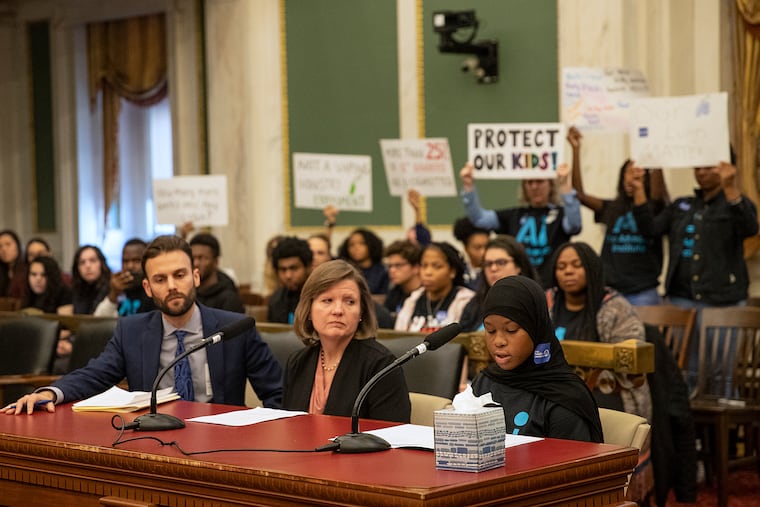Philly Council hears from physicians, students, business owners on restricting e-cigarette sales
Philadelphia joins a handful of cities and states trying to ban or restrict e-cigarette sales in response to rising numbers of lung illness cases related to vaping.

City Council’s Public Health and Human Services Committee on Wednesday moved forward a bill to ban retail stores that allow children and teens to enter from selling flavored and high-nicotine e-cigarettes. The proposal advanced in the wake of the spike in vaping-related illnesses and deaths, but has its roots in the explosion of vaping — and nicotine addiction — among children.
Those testifying at the hearing included Health Commissioner Thomas Farley, physicians, a high school student, a business owner, a lawyer who worked on one of the first class-action cases against e-cigarette maker Juul, and a consultant for tobacco giant Reynolds American.
The bill, introduced by Mayor Jim Kenney and Farley and co-sponsored by City Council members Cindy Bass and William K. Greenlee last month, would apply to the sale of e-cigarette devices and pods that deliver more nicotine than the levels found in similar products approved by the European Union. That’s just 20 milligrams of nicotine per millimeter of liquid, compared with 59 mg found in Juuls sold in the United States. (Juul sells lower-dose pods in EU countries.)
It would also apply to products that use added flavors, including mint and menthol. If passed, the bill would affect both small businesses and major retailers such as 7-Eleven and Wawa, which both sell Juuls and other e-cigarette products in Philadelphia. Stores that admit children and teens would have to limit e-cigarette sales to devices and pods with the lower nicotine levels and no flavors. Fruit and candy flavors have been linked strongly with youth sales.
“Nationally, the use of e-cigarettes and other vaping products among teenagers is at epidemic levels and continues to rise,” said Farley, who brought strawberry milk and peach mango flavored e-cigarette pods to show to Council members. He said use among people from middle school to 12th grade more than doubled between 2017 and 2019.
Farley also said data collected between 2015 and 2018 by the city’s Youth Alliance program showed that convenience stores frequently illegally sell tobacco products to children.
“For example, 34% of youth compliance checks done at 7-Elevens in Philadelphia over a three-year period resulted in an illegal sale to a minor,” Farley said.
Deaziah Wilson, a 17-year-old high school senior representing the Advocacy Institute, a public health initiative to empower Philadelphia youth, said that students use Juuls in class when teachers turn their backs. She also said that students’ academic work was being affected by how often they left classrooms to vape in bathrooms.
“Everyone knows that tobacco and cigarettes are bad for you,” Wilson said. “The word vape is an allusion to the harm that comes from using the products, and all the different flavors are the icing on the cake.”
Pennsylvania has 48 confirmed and 42 probable cases of e-cigarette or vaping-associated lung injury (EVALI), and has seen one death from the illness. Last month, State Health Secretary Rachel Levine called the cases a “public health emergency.” New Jersey has 42 confirmed and 41 probable cases of EVALI, with one death.
As of Nov. 13, there were 2,172 cases of EVALI reported from 49 states and 42 deaths, according to the Centers for Disease Control and Prevention.
This month, the CDC identified vitamin E acetate, used as a thickening agent in THC-containing e-cigarette products, as a chemical of concern among people diagnosed with EVALI. The investigation is ongoing for other chemicals that may be causing the disease. This finding has sparked pushback from nicotine-vaping advocates, who say their products are not at fault for the sudden illnesses. Regardless, public health officials say, nicotine addiction is still a serious problem.
Philadelphia is one of a number of cities and states trying to regulate e-cigarette use by teens. But many initiatives have been stalled by industry lobbying or blocked in courts, including in Michigan and California. In September, New Jersey Senate President Stephen Sweeney proposed a ban on vaping products, while Gov. Phil Murphy ordered up a new e-cigarette task force to take a closer look at regulations.
Jeff Allen, who owns Allen Bros. Wholesale Distribution in Philadelphia, which distributes tobacco products, was one of the few at Wednesday’s Council meeting who spoke against restricting e-cigarette sales, calling it a Band-Aid solution. He pointed to the city’s sweetened beverage tax, saying the drop in sales has affected jobs and tax revenue.
“What I see in Philadelphia is blocks and blocks in neighborhoods that have no stores left because they have no products to sell,” Allen said. “Everything’s regulated. What gets me is when products are brought to other counties or states" where they can be sold legally rather than keeping the business in Philadelphia.
Allen said he could not defend a store that sells vaping products to children and teens, but said stores should be policed rather than banning sales.
The bill is to receive a second reading and final vote in the coming weeks.
“We have a responsibility to young people to save them from themselves and the big business of tobacco,” said Councilman Curtis Jones Jr., who was not on the committee holding the hearing but came to testify. “If we get struck down in court, so be it. At least future generations will see that we tried.”